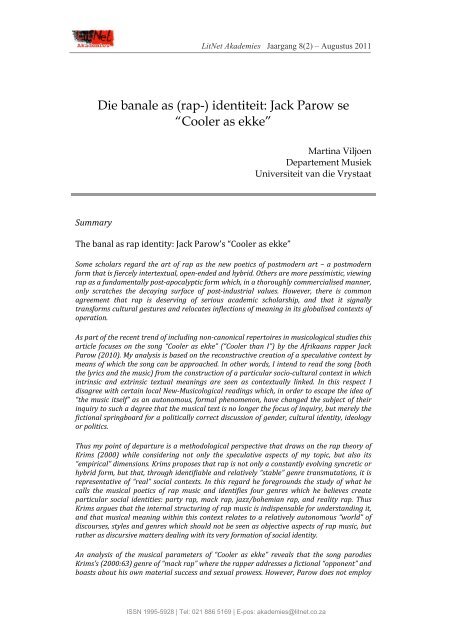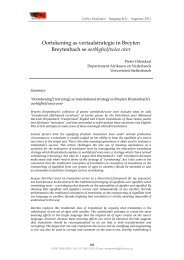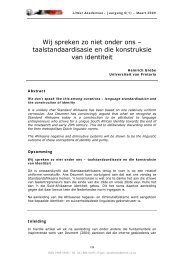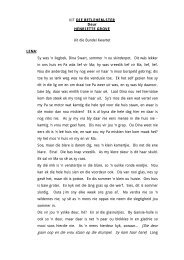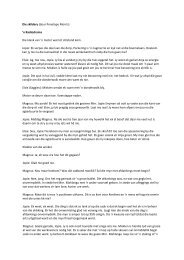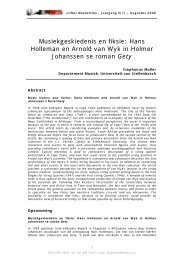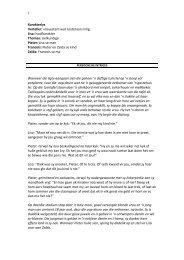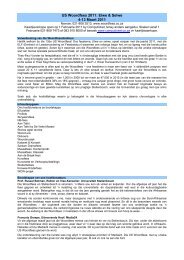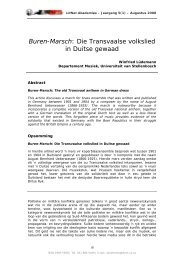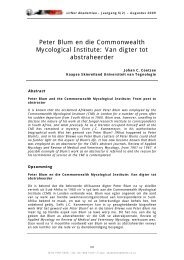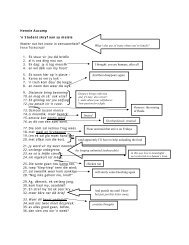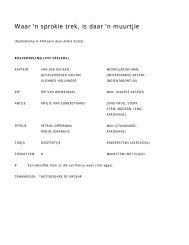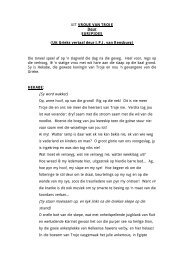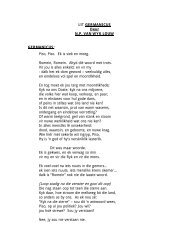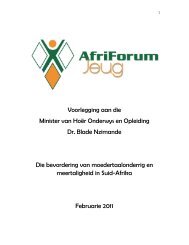- Page 1 and 2:
LitNet Akademies ’n Akademiese jo
- Page 3 and 4:
Adviesraadslede van LitNet Akademie
- Page 5 and 6:
Inhoudsopgawe Afdeling: Natuurweten
- Page 7 and 8:
Afdeling: Natuurwetenskappe
- Page 9 and 10:
LitNet Akademies Jaargang 8(2) Augu
- Page 11 and 12:
LitNet Akademies Jaargang 8(2) Augu
- Page 13 and 14:
LitNet Akademies Jaargang 8(2) Augu
- Page 15 and 16:
(e) Alle komposisies van en is mo
- Page 17 and 18:
LitNet Akademies Jaargang 8(2) Augu
- Page 19 and 20:
T(x) = 33.6348 T(L 1 U 1 x) = 18.09
- Page 21 and 22:
Dus is LitNet Akademies Jaargang 8(
- Page 23 and 24:
LitNet Akademies Jaargang 8(2) Augu
- Page 25 and 26:
Stelling 9: Vir x ∈ Mn−1 geld:
- Page 27 and 28:
LitNet Akademies Jaargang 8(2) Augu
- Page 29 and 30:
LitNet Akademies Jaargang 8(2) - Au
- Page 31 and 32:
LitNet Akademies Jaargang 8(2) - Au
- Page 33 and 34:
LitNet Akademies Jaargang 8(2) - Au
- Page 35 and 36:
LitNet Akademies Jaargang 8(2) - Au
- Page 37 and 38:
LitNet Akademies Jaargang 8(2) - Au
- Page 39 and 40:
LitNet Akademies Jaargang 8(2) - Au
- Page 41 and 42:
LitNet Akademies Jaargang 8(2) - Au
- Page 43 and 44:
LitNet Akademies Jaargang 8(2) - Au
- Page 45 and 46:
LitNet Akademies Jaargang 8(2) - Au
- Page 47 and 48:
LitNet Akademies Jaargang 8(2) - Au
- Page 49 and 50:
LitNet Akademies Jaargang 8(2) - Au
- Page 51 and 52:
LitNet Akademies Jaargang 8(2) - Au
- Page 53 and 54:
LitNet Akademies Jaargang 8(2) - Au
- Page 55 and 56:
LitNet Akademies Jaargang 8(2) - Au
- Page 57 and 58:
LitNet Akademies Jaargang 8(2) - Au
- Page 59 and 60:
LitNet Akademies Jaargang 8(2) - Au
- Page 61 and 62:
LitNet Akademies Jaargang 8(2) - Au
- Page 63 and 64:
LitNet Akademies Jaargang 8(2) - Au
- Page 65 and 66:
LitNet Akademies Jaargang 8(2) - Au
- Page 67 and 68:
LitNet Akademies Jaargang 8(2) - Au
- Page 69 and 70:
LitNet Akademies Jaargang 8(2) - Au
- Page 71 and 72:
LitNet Akademies Jaargang 8(2) - Au
- Page 73 and 74:
LitNet Akademies Jaargang 8(2) - Au
- Page 75 and 76:
LitNet Akademies Jaargang 8(2) - Au
- Page 77 and 78:
LitNet Akademies Jaargang 8(2) - Au
- Page 79 and 80:
LitNet Akademies Jaargang 8(2) - Au
- Page 81 and 82:
LitNet Akademies Jaargang 8(2) - Au
- Page 83 and 84:
LitNet Akademies Jaargang 8(2) - Au
- Page 85 and 86:
LitNet Akademies Jaargang 8(2) - Au
- Page 87 and 88:
LitNet Akademies Jaargang 8(2) - Au
- Page 89 and 90:
LitNet Akademies Jaargang 8(2) - Au
- Page 91 and 92:
LitNet Akademies Jaargang 8(2) - Au
- Page 93 and 94:
LitNet Akademies Jaargang 8(2) - Au
- Page 95 and 96:
LitNet Akademies Jaargang 8(2) - Au
- Page 97 and 98:
LitNet Akademies Jaargang 8(2) - Au
- Page 99 and 100:
LitNet Akademies Jaargang 8(2) - Au
- Page 101 and 102:
LitNet Akademies Jaargang 8(2) - Au
- Page 103 and 104:
LitNet Akademies Jaargang 8(2) - Au
- Page 105 and 106:
LitNet Akademies Jaargang 8(2) - Au
- Page 107 and 108:
LitNet Akademies Jaargang 8(2) - Au
- Page 109 and 110:
LitNet Akademies Jaargang 8(2) - Au
- Page 111 and 112:
LitNet Akademies Jaargang 8(2) - Au
- Page 113 and 114:
LitNet Akademies Jaargang 8(2) - Au
- Page 115 and 116:
LitNet Akademies Jaargang 8(2) - Au
- Page 117 and 118:
LitNet Akademies Jaargang 8(2) - Au
- Page 119 and 120:
LitNet Akademies Jaargang 8(2) - Au
- Page 121 and 122:
LitNet Akademies Jaargang 8(2) - Au
- Page 123 and 124:
LitNet Akademies Jaargang 8(2) - Au
- Page 125 and 126:
LitNet Akademies Jaargang 8(2) - Au
- Page 127 and 128:
LitNet Akademies Jaargang 8(2) - Au
- Page 129 and 130:
LitNet Akademies Jaargang 8(2) - Au
- Page 131 and 132:
LitNet Akademies Jaargang 8(2) - Au
- Page 133 and 134:
LitNet Akademies Jaargang 8(2) - Au
- Page 135 and 136:
LitNet Akademies Jaargang 8(2) - Au
- Page 137 and 138:
LitNet Akademies Jaargang 8(2) - Au
- Page 139 and 140:
LitNet Akademies Jaargang 8(2) - Au
- Page 141 and 142:
LitNet Akademies Jaargang 8(2) - Au
- Page 143 and 144:
LitNet Akademies Jaargang 8(2) - Au
- Page 145 and 146:
LitNet Akademies Jaargang 8(2) - Au
- Page 147 and 148:
LitNet Akademies Jaargang 8(2) - Au
- Page 149 and 150:
3.3.4 Tekstuele patrone LitNet Akad
- Page 151 and 152:
LitNet Akademies Jaargang 8(2) - Au
- Page 153 and 154:
LitNet Akademies Jaargang 8(2) - Au
- Page 155 and 156:
LitNet Akademies Jaargang 8(2) - Au
- Page 157 and 158:
LitNet Akademies Jaargang 8(2) - Au
- Page 159 and 160:
LitNet Akademies Jaargang 8(2) - Au
- Page 161 and 162:
153 LitNet Akademies Jaargang 8(2)
- Page 163 and 164:
155 1. Inleiding LitNet Akademies J
- Page 165 and 166:
157 LitNet Akademies Jaargang 8(2)
- Page 167 and 168:
159 LitNet Akademies Jaargang 8(2)
- Page 169 and 170:
161 LitNet Akademies Jaargang 8(2)
- Page 171 and 172:
163 LitNet Akademies Jaargang 8(2)
- Page 173 and 174:
165 LitNet Akademies Jaargang 8(2)
- Page 175 and 176:
167 LitNet Akademies Jaargang 8(2)
- Page 177 and 178:
169 LitNet Akademies Jaargang 8(2)
- Page 179 and 180:
171 LitNet Akademies Jaargang 8(2)
- Page 181 and 182:
173 LitNet Akademies Jaargang 8(2)
- Page 183 and 184:
175 LitNet Akademies Jaargang 8(2)
- Page 185 and 186:
177 LitNet Akademies Jaargang 8(2)
- Page 187 and 188:
179 LitNet Akademies Jaargang 8(2)
- Page 189 and 190:
181 5.2.6 Oorkoepelende tema LitNet
- Page 191 and 192:
183 Botha, E. 1992. Kortverhaal. In
- Page 193 and 194:
185 LitNet Akademies Jaargang 8(2)
- Page 195 and 196:
187 LitNet Akademies Jaargang 8(2)
- Page 197 and 198:
LitNet Akademies Jaargang 8(2) - Au
- Page 199 and 200:
LitNet Akademies Jaargang 8(2) - Au
- Page 201 and 202: LitNet Akademies Jaargang 8(2) - Au
- Page 203 and 204: LitNet Akademies Jaargang 8(2) - Au
- Page 205 and 206: LitNet Akademies Jaargang 8(2) - Au
- Page 207 and 208: LitNet Akademies Jaargang 8(2) - Au
- Page 209 and 210: LitNet Akademies Jaargang 8(2) - Au
- Page 211 and 212: LitNet Akademies Jaargang 8(2) - Au
- Page 213 and 214: LitNet Akademies Jaargang 8(2) - Au
- Page 215 and 216: LitNet Akademies Jaargang 8(2) - Au
- Page 217 and 218: LitNet Akademies Jaargang 8(2) - Au
- Page 219 and 220: LitNet Akademies Jaargang 8(2) - Au
- Page 221 and 222: LitNet Akademies Jaargang 8(2) - Au
- Page 223 and 224: LitNet Akademies Jaargang 8(2) - Au
- Page 225 and 226: LitNet Akademies Jaargang 8(2) - Au
- Page 227 and 228: LitNet Akademies Jaargang 8(2) - Au
- Page 229 and 230: LitNet Akademies Jaargang 8(2) - Au
- Page 231 and 232: LitNet Akademies Jaargang 8(2) - Au
- Page 233 and 234: LitNet Akademies Jaargang 8(2) - Au
- Page 235 and 236: LitNet Akademies Jaargang 8(2) - Au
- Page 237 and 238: LitNet Akademies Jaargang 8(2) - Au
- Page 239 and 240: LitNet Akademies Jaargang 8(2) - Au
- Page 241 and 242: - Fundamentele toekomstige verander
- Page 243 and 244: LitNet Akademies Jaargang 8(2) - Au
- Page 245 and 246: LitNet Akademies Jaargang 8(2) - Au
- Page 247 and 248: LitNet Akademies Jaargang 8(2) - Au
- Page 249 and 250: Bibliografie LitNet Akademies Jaarg
- Page 251: LitNet Akademies Jaargang 8(2) - Au
- Page 255 and 256: LitNet Akademies Jaargang 8(2) - Au
- Page 257 and 258: LitNet Akademies Jaargang 8(2) - Au
- Page 259 and 260: LitNet Akademies Jaargang 8(2) - Au
- Page 261 and 262: LitNet Akademies Jaargang 8(2) - Au
- Page 263 and 264: LitNet Akademies Jaargang 8(2) - Au
- Page 265 and 266: LitNet Akademies Jaargang 8(2) - Au
- Page 267 and 268: LitNet Akademies Jaargang 8(2) - Au
- Page 269 and 270: LitNet Akademies Jaargang 8(2) - Au
- Page 271 and 272: LitNet Akademies Jaargang 8(2) - Au
- Page 273 and 274: LitNet Akademies Jaargang 8(2) - Au
- Page 275 and 276: LitNet Akademies Jaargang 8(2) - Au
- Page 277 and 278: LitNet Akademies Jaargang 8(2) - Au
- Page 279 and 280: LitNet Akademies Jaargang 8(2) - Au
- Page 281 and 282: LitNet Akademies Jaargang 8(2) - Au
- Page 283 and 284: LitNet Akademies Jaargang 8(2) - Au
- Page 285 and 286: LitNet Akademies Jaargang 8(2) - Au
- Page 287 and 288: LitNet Akademies Jaargang 8(2) - Au
- Page 289 and 290: LitNet Akademies Jaargang 8(2) - Au
- Page 291 and 292: LitNet Akademies Jaargang 8(2) - Au
- Page 293 and 294: LitNet Akademies Jaargang 8(2) - Au
- Page 295 and 296: LitNet Akademies Jaargang 8(2) - Au
- Page 297 and 298: LitNet Akademies Jaargang 8(2) - Au
- Page 299 and 300: LitNet Akademies Jaargang 8(2) - Au
- Page 301 and 302: LitNet Akademies Jaargang 8(2) - Au
- Page 303 and 304:
LitNet Akademies Jaargang 8(2) - Au
- Page 305 and 306:
LitNet Akademies Jaargang 8(2) - Au
- Page 307 and 308:
LitNet Akademies Jaargang 8(2) - Au
- Page 309 and 310:
eenbleek (gedig 5, r. 4) / bone-ble
- Page 311 and 312:
LitNet Akademies Jaargang 8(2) - Au
- Page 313 and 314:
LitNet Akademies Jaargang 8(2) - Au
- Page 315 and 316:
LitNet Akademies Jaargang 8(2) - Au
- Page 317 and 318:
Summary LitNet Akademies Jaargang 8
- Page 319 and 320:
LitNet Akademies Jaargang 8(2) - Au
- Page 321 and 322:
LitNet Akademies Jaargang 8(2) - Au
- Page 323 and 324:
LitNet Akademies Jaargang 8(2) - Au
- Page 325 and 326:
LitNet Akademies Jaargang 8(2) - Au
- Page 327 and 328:
LitNet Akademies Jaargang 8(2) - Au
- Page 329 and 330:
LitNet Akademies Jaargang 8(2) - Au
- Page 331 and 332:
LitNet Akademies Jaargang 8(2) - Au
- Page 333 and 334:
LitNet Akademies Jaargang 8(2) - Au
- Page 335 and 336:
Lees die volgende sinne: Hulle ken
- Page 337 and 338:
LitNet Akademies Jaargang 8(2) - Au


